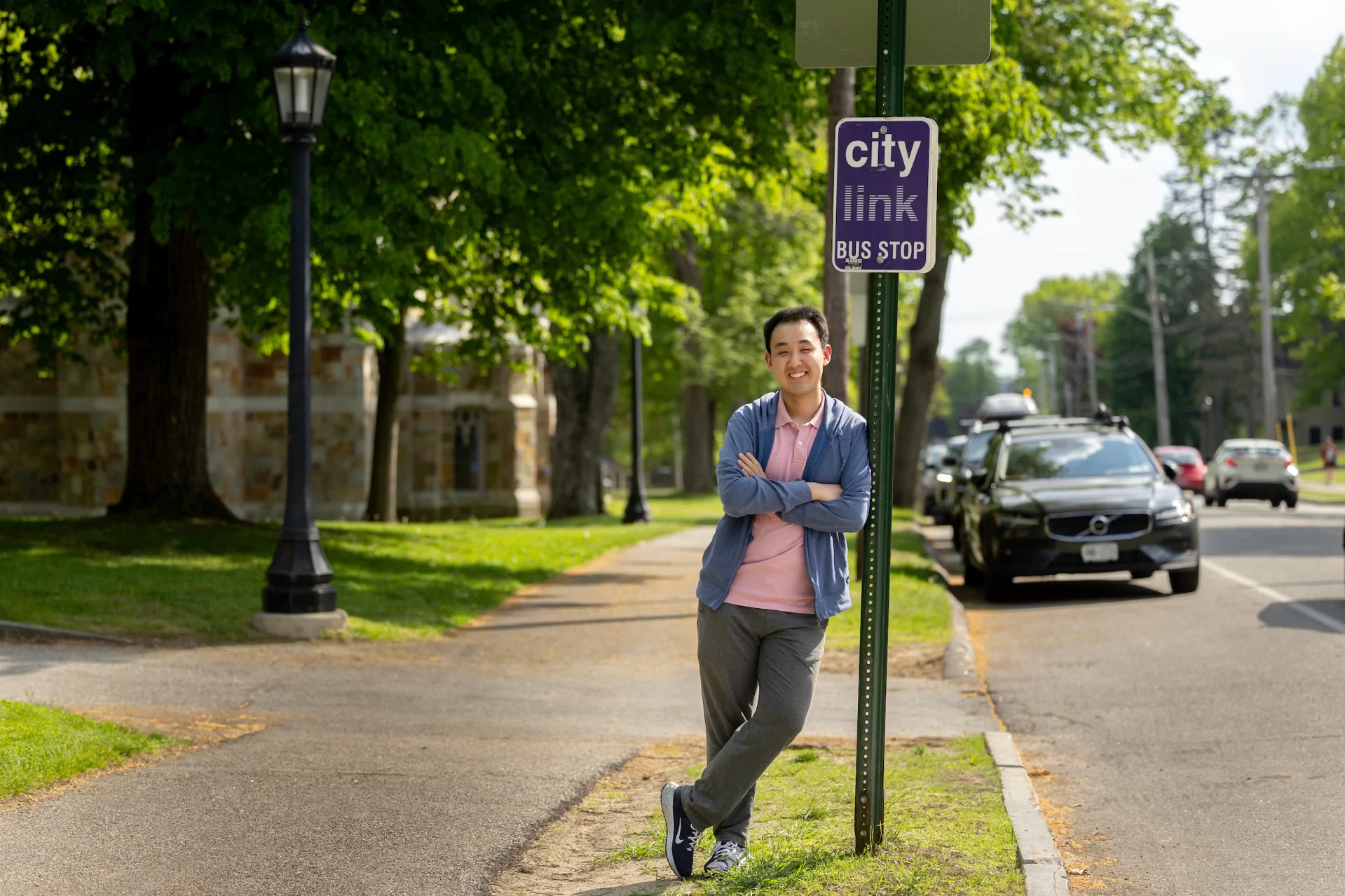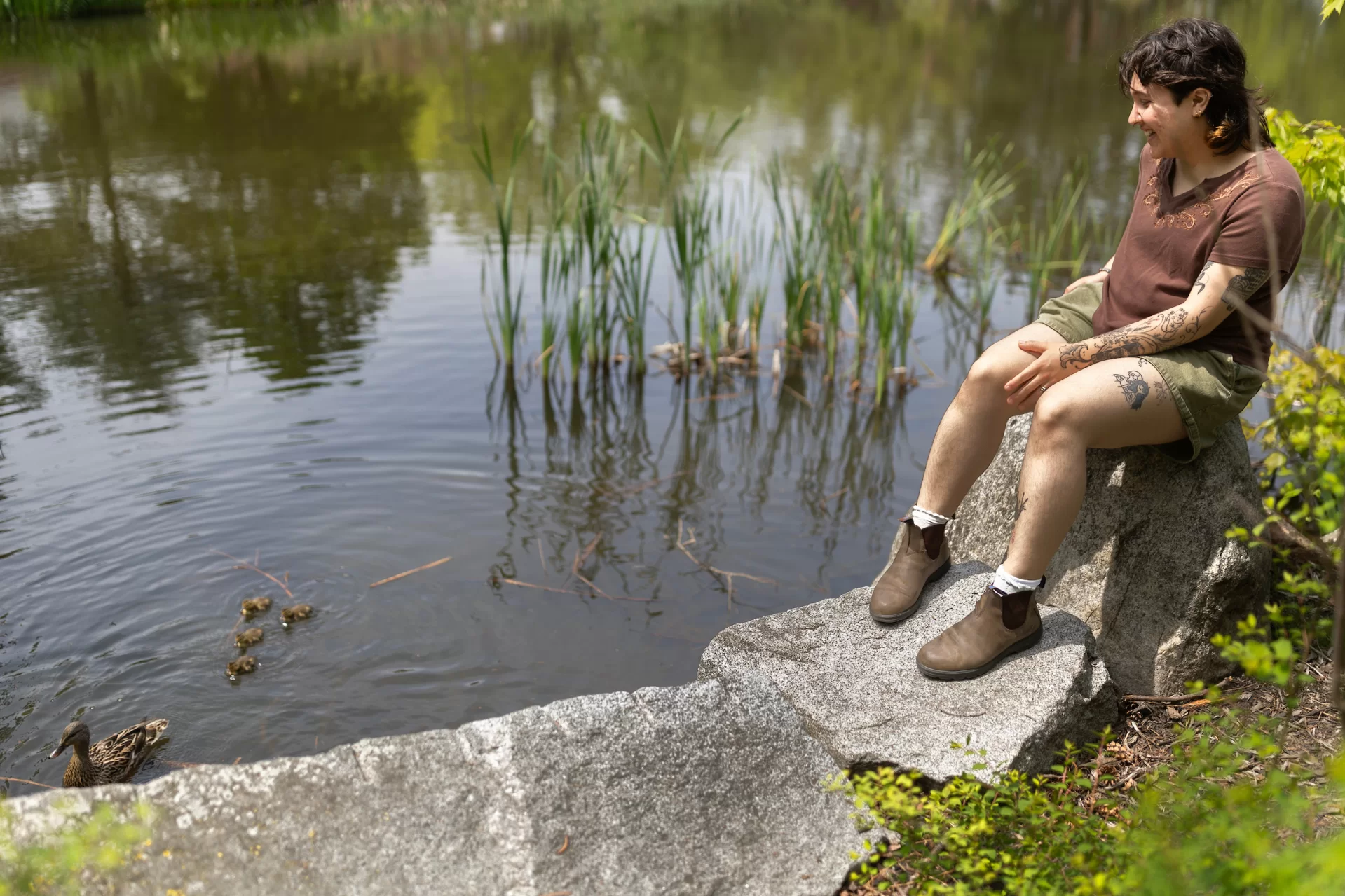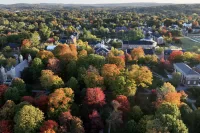
When Alan Wang ’24 studied abroad in Kyoto, Japan, as a junior, he relished the seamless transportation options — bicycle, bus, train — that delivered him to classes at Doshisha University.
But when Wang worked for the Maine Secretary of State’s Office last summer, he had to drive from Lewiston to Augusta, and it was a different experience. “Exhausting,” he said.
The following semester, Wang read Better Buses, Better Cities. “One of the takeaways is people don’t use buses because buses don’t make themselves known to people,” said Wang. “A lot of students don’t even know the bus stop at Bates exists. Building a bus shelter is the best way to remind them.”

Those experiences sparked an interest in public transportation advocacy, so he went to work, doing research and turning to the college’s Green Innovation Grant program, which awards funds to Bates community members for projects that make Bates and the community more environmentally sustainable.
In the spring, Wang received a $2,000 Green Grant — one of four grants totalling $8,000 dispersed from the program this year — to help fund the construction of a more prominent and welcoming bus stop for the new Portland–Lewiston commuter bus line slated to begin later this year. The project was one of four Green Grant projects funded this year.
The enclosed bus stop will be built near Gomes Chapel by the Maine Department of Transportation in conjunction with the Lewiston-Auburn Transit Committee. While the $2,000 grant will pay for a fraction of the final cost — around $40,000 to $50,000 — of the new Bates bus stop, the private funding from the college also will help secure other matching state or federal transportation funds.
Wang has met with community leaders in Lewiston and Auburn in his effort to bring an attractive public bus stop to campus, one of several new enclosed bus shelters in the two cities.

”His advocacy for transit is strong,” said Larry Allen, the Lewiston-Auburn Transit Committee director. “Alan espoused the benefits of consolidating transit activities between the two lines at one location on campus. This eliminates confusion and allows for the bundling of resources, such as infrastructure and capital resources.”
With a Bates politics degree now in hand, Wang, who is from Jiaozuo, China, will test his new interest in urban planning this summer in the Lincoln (Maine) County Regional Planning Department as a transportation planning assistant. “This internship will give me a great lens on if I actually want to pursue this as my career,” he said.
A second funded proposal from Gianluca Yornet de Rosas ’24 of Mendoza, Argentina, who used his Green Grant to team up with Facility Services to add the first bird-safe window treatment at Bates. The idea came after he witnessed bird fatalities from strikes on the windows of his residence.

Yornet, who hopes to go into environmental conservation work, grew up in the South American region around the Andes Mountains, where he was fascinated by the Andean Condor, the largest raptor in the world. The environmental studies major also knew that bird strikes on windows are a leading cause of avian mortality — resulting in up to an estimated 1 billion bird fatalities annually, according to the U.S. Fish and Wildlife Service.
Because of the reflective and mirror qualities of window panes, birds often can’t detect the glass barrier. Yornet’s $2,000 grant funded the purchase and installation of several adhesive bird-safe window treatments that use tiny patterns to alert birds to the window.
He hopes it’s a good start. “Maybe if it stops the birds from colliding with the windows and dying, other students might continue the project, or this will be adopted into other buildings. I wanted to make sure it got done, even if it doesn’t solve the whole issue.”

Another Green Grant grant will fund the installation of signage aimed at lessening contamination in recycling in residences. The idea was the brainchild of Caroline Mayer ’26 of Wolfeboro, N.H., and Sarah Smith ’26 of Severna Park, Md., two EcoReps who worked the past year on improving recycling habits around campus.
The signage will be placed right where students live: their rooms. “We have good signage in all of the trash and recycling rooms, but the sorting is happening in the dorm room, not once you’re down in the trash room,” said Tom Twist, assistant director of sustainability at Bates. “By then, it’s already done.”
The signs, affixed to the back doors of rooms, spell out the recyclable material — cardboard, plastic, paper containers, glass, and metal — and that all other items should go to the landfill. “When in doubt, throw it out,” say the signs designed by Smith and Mayer, who plan to target first-year residences to instill good recycling practices at the start of their time at Bates.
Liza Bell ’26 of Putney, Vt., won a GIG to resupply tools for the Bates bike shop, a much needed purchase after a theft last summer depleted the supply.
The grant helped fund 30 new tools as well as a new lock system for the nine loaner bikes available to students. In addition, Bell said the grant helped keep those loaners in the Ladd Library gear library in good working order. As a result, usage increased this spring, with all nine bikes checked out much of the time.
“This project will contribute to the school’s green bike share program which makes biking on campus more accessible. By having the necessary tools and locks we will be able to continue to expand and improve the program,” Bell explained in her proposal.
This story was updated on November 3, 2025 to reflect more recent information on the number of birds killed each year from window strikes.




